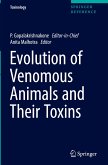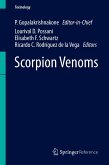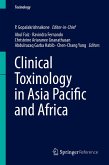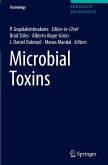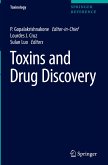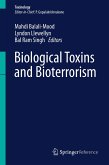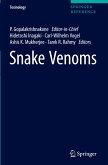Evolution of Venomous Animals and Their Toxins, m. 1 Buch, m. 1 E-Book
Mit E-Book
Herausgegeben:Gopalakrishnakone, P.; Malhotra, Anita
Versandkostenfrei innerhalb Deutschlands
279,99 €
inkl. MwSt.
Versandkostenfrei*
Liefertermin unbestimmt
Melden Sie sich
hier
hier
für den Produktalarm an, um über die Verfügbarkeit des Produkts informiert zu werden.

140 °P sammeln
Evolution of Venomous Animals and Their Toxins, m. 1 Buch, m. 1 E-Book
Mit E-Book
Herausgegeben:Gopalakrishnakone, P.; Malhotra, Anita
- Audio CD mit DVD
This volume contains a section on the wider evolutionary context of venom in animals, the molecular evolutionary processes involved in generating diversity, and the concept of venom evolution as being driven by an arms race that also involves evolution of resistance to toxins by prey. It also studies the relationship between the evolution of toxins and the evolution of the animals that they evolved within. The last section discusses the evolution of venom delivery systems. The definition of a venomous animal, as opposed to a poisonous one, encompasses the evolution not just of toxins but also a specialized mechanism for administering them by injection.…mehr
Andere Kunden interessierten sich auch für
![Evolution of Venomous Animals and Their Toxins Evolution of Venomous Animals and Their Toxins]() Evolution of Venomous Animals and Their Toxins223,99 €
Evolution of Venomous Animals and Their Toxins223,99 €![Scorpion Venoms Scorpion Venoms]() Scorpion Venoms298,99 €
Scorpion Venoms298,99 €![Clinical Toxinology in Asia Pacific and Africa Clinical Toxinology in Asia Pacific and Africa]() Clinical Toxinology in Asia Pacific and Africa298,99 €
Clinical Toxinology in Asia Pacific and Africa298,99 €![Microbial Toxins Microbial Toxins]() Microbial Toxins282,99 €
Microbial Toxins282,99 €![Toxins and Drug Discovery Toxins and Drug Discovery]() Toxins and Drug Discovery223,99 €
Toxins and Drug Discovery223,99 €![Biological Toxins and Bioterrorism Biological Toxins and Bioterrorism]() Biological Toxins and Bioterrorism224,99 €
Biological Toxins and Bioterrorism224,99 €![Snake Venoms Snake Venoms]() Snake Venoms208,99 €
Snake Venoms208,99 €-
-
-
This volume contains a section on the wider evolutionary context of venom in animals, the molecular evolutionary processes involved in generating diversity, and the concept of venom evolution as being driven by an arms race that also involves evolution of resistance to toxins by prey. It also studies the relationship between the evolution of toxins and the evolution of the animals that they evolved within. The last section discusses the evolution of venom delivery systems. The definition of a venomous animal, as opposed to a poisonous one, encompasses the evolution not just of toxins but also a specialized mechanism for administering them by injection.
Produktdetails
- Produktdetails
- Toxinology
- Verlag: Springer / Springer Netherlands
- Artikelnr. des Verlages: 978-94-007-6459-0
- 1st ed. 2017
- Seitenzahl: 446
- Erscheinungstermin: März 2018
- Englisch
- Abmessung: 235mm x 155mm
- ISBN-13: 9789400764590
- ISBN-10: 9400764596
- Artikelnr.: 37071337
- Herstellerkennzeichnung Die Herstellerinformationen sind derzeit nicht verfügbar.
- Toxinology
- Verlag: Springer / Springer Netherlands
- Artikelnr. des Verlages: 978-94-007-6459-0
- 1st ed. 2017
- Seitenzahl: 446
- Erscheinungstermin: März 2018
- Englisch
- Abmessung: 235mm x 155mm
- ISBN-13: 9789400764590
- ISBN-10: 9400764596
- Artikelnr.: 37071337
- Herstellerkennzeichnung Die Herstellerinformationen sind derzeit nicht verfügbar.
Prof P. Gopalakrishnakone is a world leader in the characterization of the structure and function of animal and plant toxins and chemical poisons, which contain highly specific and biologically active components. He has contributed significantly to the body of knowledge regarding the anatomy of snake venom glands and the development of drug candidates from animal toxins.
Prof Gopal pioneered the development of the NUS Venom and Toxin Research Programme, which has put NUS at the forefront of toxin research internationally. The technology platform that has been built over the years under the Venom and Toxin Research Programme, coupled with its extensive library of protein and peptides, has enabled Prof Gopal and his team to complete the discovery process of lead candidates in time and to transfer valuable supplementary information to the next discovery steps involving profiling and optimization of lead candidates. The objective is to characterize the venom components and natural toxins at a molecular level and identify promising compounds amenable to the development of novel human therapeutics. Prof Gopal's lab has identified over twenty peptides with unique medical indications from venom-based proteins with some already under development as therapeutics.
Prof Gopal's research studies includes structure function studies (toxin detection, biosensors, antitoxins and neutralization factors), toxicogenomics and expression studies, antimicrobial peptides from venoms and toxins and PLA2 inhibitors as potential drug candidate for inflammatory diseases. The techniques he employs include quantum dots to toxinology, computational biology, microarrays and protein chips. He has patented analgesic peptide, anti inflammatory peptide as well as anti rheumatoid arthritis peptides. He is exploring various possibilities of delivery systems for these peptides to target sites and administration of these peptides orally, transdermally, ocular and injections.
Prof Gopal has over 100 international peer-reviewed papers in venom and toxin research, drug discovery, biosensors, and toxinogenomics. His research awards include the Outstanding University Researcher Award from the National University of Singapore (1998); Ministerial Citation, NSTB Year 2000 Award in Singapore; and the Research Excellence Award from the Faculty of Medicine, National University of Singapore (2003). His awards in teaching include, Faculty Teaching Excellence Award 2003/4 & NUS Annual Teaching Excellence Award 2003/4. He also received the Faculty Teaching Excellence Award in 2009/10 and the Annual Teaching Excellence Award, NUS FOR 2009/10. He is the President of International Society on Toxinology till 2012, and is a member of the editorial board of Toxicon, the official journal of the International Society on Toxinology.
Prof Gopal pioneered the development of the NUS Venom and Toxin Research Programme, which has put NUS at the forefront of toxin research internationally. The technology platform that has been built over the years under the Venom and Toxin Research Programme, coupled with its extensive library of protein and peptides, has enabled Prof Gopal and his team to complete the discovery process of lead candidates in time and to transfer valuable supplementary information to the next discovery steps involving profiling and optimization of lead candidates. The objective is to characterize the venom components and natural toxins at a molecular level and identify promising compounds amenable to the development of novel human therapeutics. Prof Gopal's lab has identified over twenty peptides with unique medical indications from venom-based proteins with some already under development as therapeutics.
Prof Gopal's research studies includes structure function studies (toxin detection, biosensors, antitoxins and neutralization factors), toxicogenomics and expression studies, antimicrobial peptides from venoms and toxins and PLA2 inhibitors as potential drug candidate for inflammatory diseases. The techniques he employs include quantum dots to toxinology, computational biology, microarrays and protein chips. He has patented analgesic peptide, anti inflammatory peptide as well as anti rheumatoid arthritis peptides. He is exploring various possibilities of delivery systems for these peptides to target sites and administration of these peptides orally, transdermally, ocular and injections.
Prof Gopal has over 100 international peer-reviewed papers in venom and toxin research, drug discovery, biosensors, and toxinogenomics. His research awards include the Outstanding University Researcher Award from the National University of Singapore (1998); Ministerial Citation, NSTB Year 2000 Award in Singapore; and the Research Excellence Award from the Faculty of Medicine, National University of Singapore (2003). His awards in teaching include, Faculty Teaching Excellence Award 2003/4 & NUS Annual Teaching Excellence Award 2003/4. He also received the Faculty Teaching Excellence Award in 2009/10 and the Annual Teaching Excellence Award, NUS FOR 2009/10. He is the President of International Society on Toxinology till 2012, and is a member of the editorial board of Toxicon, the official journal of the International Society on Toxinology.
A Critique of the Toxicoferan Hypothesis.- Evolution of Resistance to Toxins in Prey.- Evolution of Separate Predation- and Defence-Evoked Venoms in Carnivorous Cone Snails.- Evolutionary Context of Venom in Animals.- Functional and Genetic Diversity of Toxins in Sea Anemones.- Independent Origins of Scorpion Toxins Affecting Potassium and Sodium Channels.- Mutation, Duplication, and More in the Evolution of Venomous Animals and Their Toxins.- Parasitoid Wasps and Their Venoms.- The Strategic Use of Venom by Spiders.- Toxicity in Cephalopods.- Venom Use in Mammals: Evolutionary Aspects.- Venom as a Component of External Immune Defense in Hymenoptera.- Phylogeny of Annelida.- Systematics and Evolution of the Conoidea.- Systematics of Cephalopods.- Systematics of Siphonophores.- Evolution of the Snake Venom Delivery System.- Evolution, Morphology and Development of the Centipede Venom System.- Evolutionary History of Venom Glands in the Siluriformes.
A Critique of the Toxicoferan Hypothesis.- Evolution of Resistance to Toxins in Prey.- Evolution of Separate Predation- and Defence-Evoked Venoms in Carnivorous Cone Snails.- Evolutionary Context of Venom in Animals.- Functional and Genetic Diversity of Toxins in Sea Anemones.- Independent Origins of Scorpion Toxins Affecting Potassium and Sodium Channels.- Mutation, Duplication, and More in the Evolution of Venomous Animals and Their Toxins.- Parasitoid Wasps and Their Venoms.- The Strategic Use of Venom by Spiders.- Toxicity in Cephalopods.- Venom Use in Mammals: Evolutionary Aspects.- Venom as a Component of External Immune Defense in Hymenoptera.- Phylogeny of Annelida.- Systematics and Evolution of the Conoidea.- Systematics of Cephalopods.- Systematics of Siphonophores.- Evolution of the Snake Venom Delivery System.- Evolution, Morphology and Development of the Centipede Venom System.- Evolutionary History of Venom Glands in the Siluriformes.

